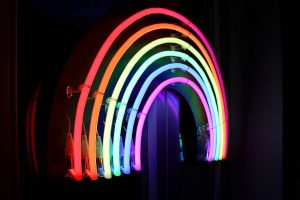This article is part of a progression
I’ve posted two things within the last year that have gotten me a lot of heat from sections of the Christian LGBT+ community. The first was an exploration into why we need to stop making a big deal out of coming out and our sexuality. The second was a discussion on how it’s impossible to be a gay Christian. If you have not read either of those posts, this one might be irrelevant to you. But, here I will attempt (because some will inevitably still take what I say the wrong way) to clarify my positions and viewpoints.
One of the biggest complaints I’ve heard from these two posts is that I’ve bought into being side-x. That is to say, I’ve said the same thing that Exodus International used to say- stop being gay and pretend to be something you’re not. I’m honestly 100% confused on where that thought even came from because nowhere have I said anything near that. But, to be clear, I’m going to put this in bold print below.
I. Am. Homosexuality. Positive.
What exactly does that mean? It means I completely believe it is okay and blessed by God to be a homosexual and live actively as such. I have affirmed this viewpoint again, and again, and again. And, on top that, I have summarized book, after book, after book that take a look at homosexuality and agree with them that it’s okay to be a homosexual. So, one more time, lest there be any further confusion- I affirm and bless homosexuality.
What I do not, however, affirm and bless is a mindset and identity that is homosexual-centric. When one makes the majority of their identity and worth out of their sexuality, they are denying themselves the richness and fullness of life by confining themselves to something that was never meant to be confining.
I can promise you I will say things from here on out that some people will not like. If you don’t want to hear what I have to say, then don’t read on. If you decide to venture into this world with me, remember that I’m on the inside of the Christian LGBT+ community, writing as someone who sees a lot of things. I’m not someone outside trying to impose my own beliefs which are stinted by my inability to empathize with those within the community.
I’m now going to highlight a few of the criticisms I’ve received based on my posts and dissect them individually. So, let’s dig in.
1.”You don’t understand the English language.”
This one is in response to my post about not being able to be a gay Christian. The gist of it is this- “gay” is simply an adjective used to describe the noun, “Christian”, and does not mean there is more importance to that part of the name. However, what is the point of an adjective? Officially, adjectives are used to describe or modify a noun. In previously discussing this with someone I used the example of a “ball” vs. a “blue ball.” In the second version, we find the noun, “ball”, to be inadequate to describe what we’re talking about so we add the modifier, “blue” so that others understand better. That example was perhaps too simplistic, so I’ll get more detailed about adjectives.
There are many different types of adjectives. There are 5 categories of adjectives, with a total of 8 different adjective uses. The first is an observation. Examples include gorgeous, hideous, outrageous, etc. These are adjectives that are subjective in nature. The next category is a physical description. Within this, you have size, shape, age, and color. I’m not going to give examples of these because they’re self-explanatory. Next up is the origin of something. This is typically associated with a place or country. Examples include- Italian, English, Thai, etc. Next, we have material, what something is made of. The last type of adjective is what is called a qualifier. We will focus on this one.
Now, a qualifying adjective is sometimes regarded as part of the noun and is used when the noun itself is not descriptive enough. Examples of this include a “hunting cabin” or a “fishing poll.” We include the adjectives to better describe what we’re actually talking about to paint a better picture in someone’s mind. My “blue ball” example was too simple because it was the wrong type of adjective. When we call ourselves “gay Christians” we are not giving an observation, or describing something physical; we’re not talking about our origin or our material. This leaves us with only the option to be qualifying our noun.
So, yes, based on the English language, when someone describes themselves or anyone else as a gay Christian they are saying, without a doubt, that the noun, Christian, is not adequate enough to describe who they are and they must qualify it. We don’t do this with anything else (save denominations which I will touch on next) so why do we feel the need to do it with our sexuality? Who we are attracted to should not qualify or modify our religious identity in any way, and yet we insist on doing it constantly. That’s putting our sexuality before our faith and that’s not okay.
2. “Do you disagree with calling ourselves Baptist Christians, etc, as well?”
Short answer, yes. While I believe that gathering with Christians who hold similar viewpoints is important, I see throughout the Bible the theme that what unifies us (Christ) is more important than anything else (our beliefs on baptism, on women in leadership, on communion, etc.) and we should identify solely with him. Yes, find a church that has beliefs similar to yours because you should not be uncomfortable in your faith community, but don’t define your faith in Christ by things that aren’t nearly as important as Him.
3. “We’re not at the point yet where homosexuality is viewed the same as heterosexuality so it’s still important to make a big deal about it.”
I couldn’t disagree more. The only reason it’s seen as a big deal or different is because we perpetuate that idea. Continuing to make a big stink out of our sexuality, or others, and their revelation that they aren’t “normal” like heterosexuals is a vicious cycle. We’ll never see heteronormativity return to sexualnormativity if we don’t start to return to sexualnormativity. As long as we continue to allow heteronormativity to be the “norm” and make a big deal out of falling outside of that, we’ll never be viewed the same. We first need to start viewing ourselves as equal before anyone else ever will. And that begins with not making “coming out” as much of an ordeal as we have made it out to be.
Now, this part is really going to rustle some feathers, but I must include it anyway. Since posting these things, I’ve discussed what I wrote, as well as the various responses, with many people (fellow Christian LGBT+ people, affirming Christians, non-affirming Christians) and there seems to be a general consensus (especially from heterosexual Christians in both camps)- why does one’s sexuality and their “coming out” have to be such a big deal? Now, to some, this may seem like they’re indifferent toward homosexuals. But, what they’re actually saying is- “We don’t care who you sleep with. We love you still and you’re still super cool.” This may not be the vocal majority of America, but, if there’s one thing we should learn from WBC- just because you’re the most vocal doesn’t mean you represent the majority opinion. I would argue that the majority of Christians (especially in the younger generations) don’t see a homosexual as any different than anyone else. So, let’s follow their lead (since they’re the ones we’re ultimately making the big deal for in the first place) and stop making ourselves stand out so much. That’s what we’re ultimately asking for anyway- equality. Let’s stop asking for it by treating ourselves differently and start to act like we’re equal.
4. “You’re asking people to go back to hiding who they are. You’ve bought into being ex-gay.”
I saved this one for last because I think it’s the most important to address. I made it very clear in my first post that this is not what I’m doing. If you missed it, I’ll include it here for you:
“Lest anyone try to accuse me of asking homosexuals to live in secret, or not be confident in who they are (I debated using the word “proud” based on the prevalence of pride rallies and parades but decided “confident” is a better term) I need to state, point blank, that that is not what I’m advocating. In reality, simply living life without “coming out” is showing more confidence in yourself because you are being yourself-nothing more, nothing less. You aren’t different; you don’t need to differentiate yourself from heterosexuals. You’re just living as yourself- someone who happens to like the same (or both) genders. And being yourself will not keep it a secret because, as you are yourself around others and live freely, without the fear of being seen as “different”/”abnormal”/”wrong”, they will learn it when they need to know it. It’s not their business either way unless you want it to be.”
Advocating the stoppage of modifying our faith and the need to stop making our sexuality such a big deal does not, I repeat, does not equate to being ex-gay. What it does equate to is being homo-positive rather than homo-centric. There are many within the Christian LGBT+ community who are living lives that are homo-centric. They thrive on being homosexual. It’s where they gain the most of their identity. This is an incredibly dangerous mindset for Christians because it removes Christ as the source of our identity and makes it our sexuality.
Man, either heterosexual or homosexual, while a sexual being, was not meant to be defined by their sexuality. We’re defined by our relationship with God. When we make everything in life about our sexuality then we’re removing God from his headship of our lives. We don’t see heterosexual Christians saying things like, “yeah I’m a straight Christian.” We shouldn’t identify that way ourselves.
I know many homosexuals who turn almost everything into a comment about their or someone else’s sexuality and it really bothers me. Our entire lives are not defined by who we are attracted to. We don’t need to constantly make reference to it. We don’t need to post Instagram photos with 30 hashtags like, “#gay, #gayboy, #instagay, #cutegay, #gayChristian, #Christiangay, #singlegay” etc. There’s more to us than our sexuality and as long as we continue to live as if all we are is homosexual than that’s all anyone will ever see us as.
When we start to live lives defined by who we are as a person, and what we do for the world, rather than just by the gender of the people we prefer to sleep with, only then will the world wake up and see homosexuality as just another form of sexuality no different from heterosexuality. Until then, we’re living exactly how they expect us to- different. Until then, homosexuality will always be viewed as something outside the norm. Something that’s a “lifestyle”. We’re literally perpetuating the very mindsets we’re trying to break people out of. How is that any good?
Now, because I don’t think I can stress this enough anymore, I’m not saying don’t be homosexual. I’m not saying don’t be comfortable with who you are. I’m not saying don’t allow people to know who you actually are. I’m not even saying you need to stop being a part of homosexual communities, or participating in (predominantly) homosexual events such a drag shows, pride rallies, and going to the local homosexual bar/club. Just like within Christian circles it’s important to surround yourself with similar people with whom you feel comfortable.
What I am saying is that we need to make sure there’s more to us than our sexuality. We need to stop being homo-centric with our lives and making that all there is. We need to stop making it a big deal when ourselves or someone else “comes out.” (I’m not saying don’t celebrate with them, but it doesn’t need to be a big show for the whole world or even a bunch of friends to see. Simply saying something like, “wow that person is cute” is the perfect way to let people know you like the gender you like without making it a big deal.) We need to allow ourselves, and others, to be comfortable enough to just be ourselves without having to label everything as homosexual. We need to stop reacting to the pain and hurt we’ve been dealt by those who disagree with us by doing the very things they accuse of being- different. I’ve been told we need visibility. All the visibility we are currently getting is maintaining the idea that being homosexual makes us different than those who are heterosexual. But that’s what we’re trying to show them isn’t true. Let’s show them by acting like we’re not different from them. That’s the kind of visibility we need. That’s the kind of visibility and mindsets I’m advocating, especially with the Christian LGBT+ community.





